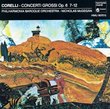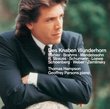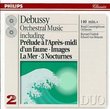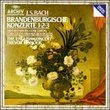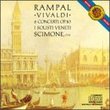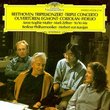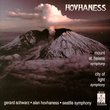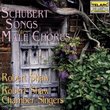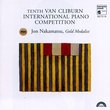| All Artists: Joseph Haydn, The English Concert and Choir, Felicity Lott, Carolyn Watkinson, Trevor Pinnock, Maldwyn Davies, David Wilson-Johnson Title: Haydn: Missa in Angustiis "Nelson Mass" - Te Deum / Lott, Watkinson, M. Davies, Wilson-Johnson; Pinnock Members Wishing: 0 Total Copies: 0 Label: Archiv Produktion Release Date: 10/25/1990 Genre: Classical Styles: Opera & Classical Vocal, Historical Periods, Classical (c.1770-1830), Sacred & Religious Number of Discs: 1 SwapaCD Credits: 1 UPC: 028942309722 |
Search - Joseph Haydn, The English Concert and Choir, Felicity Lott :: Haydn: Missa in Angustiis "Nelson Mass" - Te Deum / Lott, Watkinson, M. Davies, Wilson-Johnson; Pinnock
CD DetailsSimilarly Requested CDs
|
CD ReviewsAn Epiphany David Wihowski | Milwaukee, WI USA | 06/28/2000 (5 out of 5 stars) "Everyone who knows some classical music knows Haydn for symphonies and maybe string quartets. Most singers know him for his 2 big oratorios (The Creation and The Seasons). Then there are those who have been blessed to know Haydn's late masses and especially the "Missa in Angustiis".Here is a very mature, but piquantly creative work by Haydn. His orchestral forces (for whatever reason--it does not matter) were limited to strings, trumpets, organ and timpani. A slightly odd combination by standards of his day, where strings and woodwinds would have been more commonly used for the bulk of the orchestration. This limitation does not hinder Haydn. In fact, it seems to have stimulated his genius.The timpani and trumpets are used deftly to add to the moods of insistence (Kyrie), rejoicing (Gloria), heraldry (Credo) and awe (Sanctus). The strings declaim, support, shout and whisper the many moods of this work. The organ appears as light breaking though clouds at climatic moments in the mass.The scoring for chorus and soloists is ingenius in its variety. In the Kyrie the Soprano soloist and chorus bombard the heavens with pleas for mercy. The Gloria shifts moods (but not shockingly so) to a bouyant and simpler song of praise. Haydn dramatically changes keys and moods for the "Qui tollis." The opening of the Credo displays Haydn's contrapuntal skill as it is an extended Canon in 4ths. Now with the "Et incarnatus" and "Et Resurrexit" Haydn allows Romantic word-painting to direct the course of the music. The "Et Resurrexit" begins with a "rocket" (ascending up) theme that is neither trite nor expected. The Credo section completes with spirituality that is confident, graceful and genuine. The Sanctus hearkens back to the Renaissance, yet with a hint of the martial timpani and trumpets to make it an emotionally complex movement. By the time we have arrived at the "dona nobis pacem" we have been on a musical and spiritual tour de force.The work has many moods, operatic solos, excellent choruses, orchestral fireworks, counterpoint that a baroque master would be proud of, AND yet it all flows with the unity of a river.I have performed this work several times (as a bass in the chorus) and listened to it many more. I have yet to tire of it. I think this is the greatest of his late masses and that is equal to the oratorios in quality. It certainly is one of Haydn's most emotionally revealing works.The "Te Deum" is a festive and celebratory, yet sophisticated composition. It is a fitting piece to round out the recording.The orchestral playing, and choral work are stunning. The Soprano soloist is perfectly suited to the aerial acrobatics Haydn has given her. The other soloists are fine, as well (though their parts are not as demanding as those for the soprano). Pinnock keeps everything classically balanced, while allowing the hints of the early romanticism of the time to blossom. The tempos are right. The dynamics are expressive, yet controlled. An exquisite recording of an exquisite work.To know Haydn even partially you must hear this mass. Buy this recording of it. And if you ever have the opportunity to hear it live, do not let it pass." A stunning performance for a spectacular work. danielinyaracuy | San Felipe, Yaracuy Venezuela | 03/29/2001 (5 out of 5 stars) "From its omnious introduction to the raw emotional thrill at the openeing of the Gloria one is always amazed at how extraordinary is this piece of music, and how exquisitely powerful is its rendering by Mr. Pinnock. The variety of moods and musical constructs, the emotional power, the refined craft of Haydn, his zest for life, his faith, it is all there. Let us not doubt why this is perhaps the most "famous" of Haydn's mass. To this listener, this mass "in angustiis" together with the Creation and the London Symphonies represent the summits of Haydn's work. A must have recording, or one of the desert island recording that a co-reviewer suggested. To be objective, I was not as impressed with the "te deum", but then again, I cannot think of any opus that would not have suffered from trailing this excellent and excellently performed mass."
|

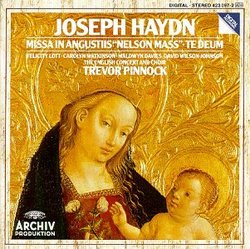
 Track Listings (14) - Disc #1
Track Listings (14) - Disc #1